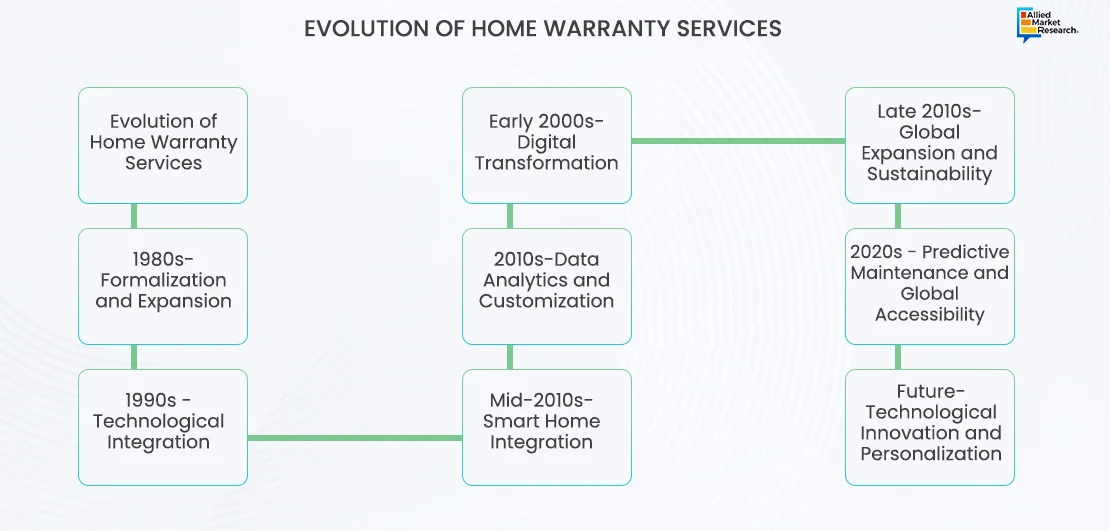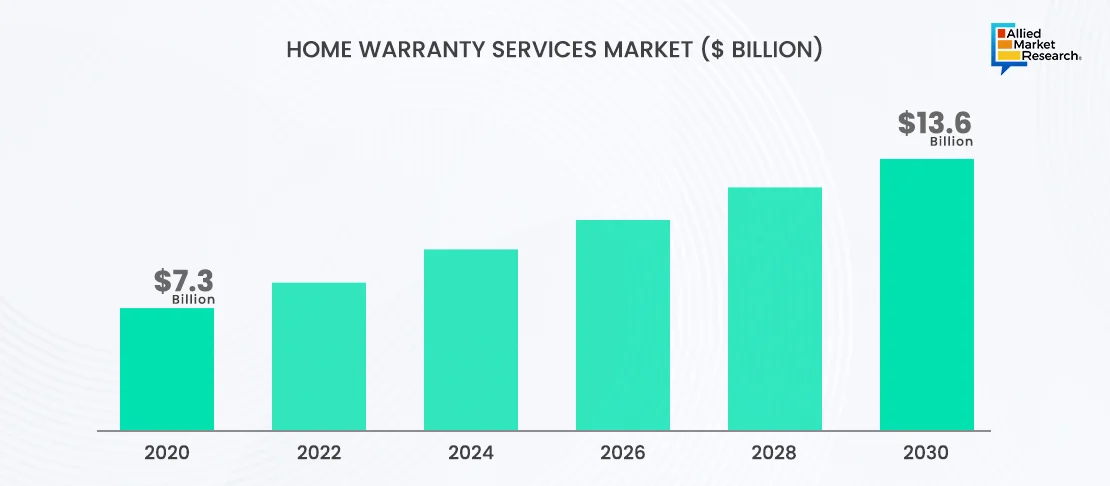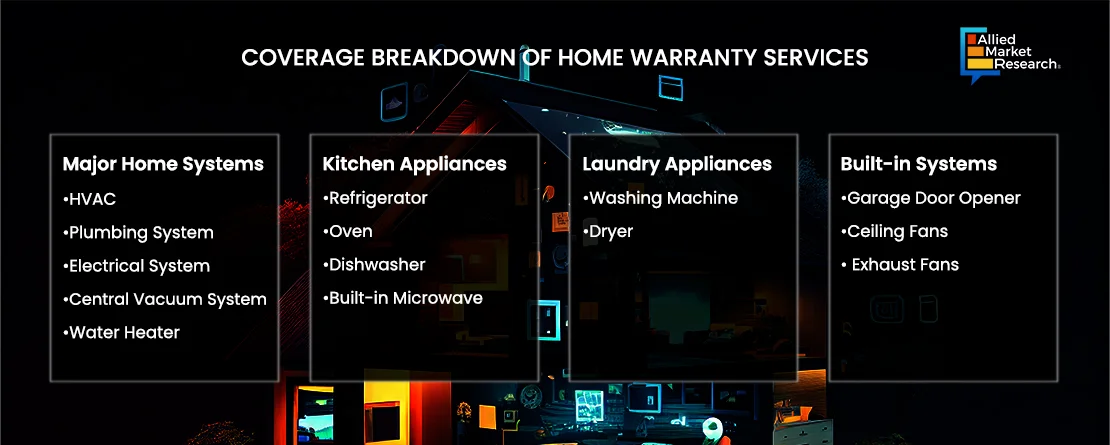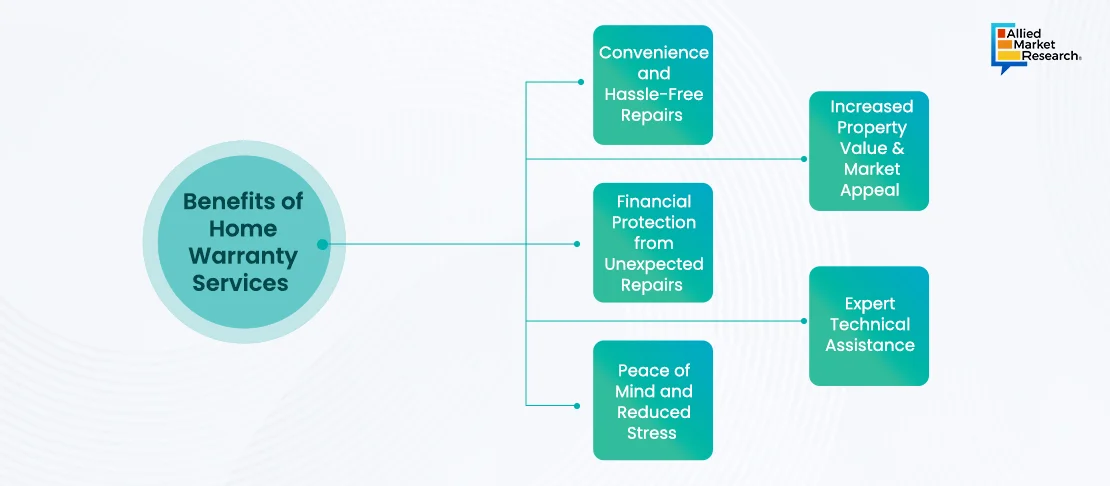Table Of Contents

Sonia Mutreja

Pooja Parvatkar
Redefining Home Warranty Services in an Era of Unprecedented Assurance

The home warranty industry has evolved significantly over the decades. Initially established in California to meet the risk management needs of homebuyers and sellers, this industry has grown robustly, reflecting its critical role in the real estate and homeownership sectors. Today, home warranty services, also known as home service contracts, are integral in offering service, repair, or replacement of major home systems and household appliances due to normal wear and tear. These contracts typically cover essential components such as heating, ventilation, air conditioning systems (HVAC), plumbing, electrical systems, and standard kitchen appliances like dishwashers and microwaves.

The adoption of home service contracts has been notably high in real estate transactions, with an estimated 1,596,000 contracts sold in 2007 as part of real estate transactions, signifying their value in the property market. Particularly in California, where this industry began, an impressive 92% of all home sales include a home warranty, highlighting the region's deep-rooted reliance on these services for risk management in real estate transactions??.
Despite the growth, the home warranty industry has navigated through complexities, including regulatory challenges. The National Association of Insurance Commissioners (NAIC), after extensive deliberation from 1978 to 1995, concluded that service contracts do not constitute the business of insurance. This decision emphasized a distinct recognition of the home service contract industry, advocating for regulation under general state consumer protection laws rather than insurance codes. This approach has led to a clearer legislative trend of exempting home service contracts from insurance codes, recognizing the unique nature of these services that are fundamentally different from insurance policies??.
Furthermore, the industry's regulatory landscape has been shaped by the involvement of the NAIC and efforts to differentiate service contracts from traditional insurance. The clarification that home service contracts are not insurance but agreements for service, repair, or replacement of home appliances and systems due to wear and tear has been critical in framing consumer expectations and regulatory approaches??.
The home warranty industry's journey from its inception to its current state reflects its adaptation to changing homeowner needs and regulatory environments. As it continues to grow and evolve, the industry's commitment to providing peace of mind and financial protection to homeowners remains its cornerstone, underpinning its value in today's real estate transactions and beyond.
Global Adoption of Home Warranty Services
The global landscape of home warranty services is witnessing a transformative phase, marked by a significant expansion in market size and adoption across various regions. As of 2020, the home warranty service market stood at $7.3 billion and is projected to almost double to $13.6 billion by 2030, with a compounded annual growth rate (CAGR) of 6.3%. This growth trajectory is primarily fueled by the increasing need to protect expensive appliances and a surge in consumer awareness regarding the benefits of home warranty services. The market's expansion is further supported by rising expenditure on home services in emerging economies, presenting lucrative opportunities for the sector's future??.

North America has historically dominated the home warranty services market, a trend expected to continue. Conversely, the Asia-Pacific region is poised for considerable growth, coupled with increased per capita income. This indicates a shift towards a more globally diversified market, where regions outside of North America are beginning to contribute significantly to the market's growth??.
Impact of Home Warranty Services
Home warranty services significantly influence homeownership by providing an assurance blanket over unexpected repair and maintenance costs. A typical home warranty plan offers coverage for multiple systems and appliances in your home, irrespective of their brand, manufacturer, or age. This is in stark contrast to a manufacturer’s warranty, which is usually limited to specific products or systems and covers only service, repair, and sometimes replacement costs??.

An example of the impact of home warranty services can be seen in scenarios involving significant home system failures. For instance, encountering plumbing issues in a new home can be daunting and expensive, potentially costing several thousand dollars if major repairs are needed. With a home warranty, the homeowner would simply contact their provider, and a qualified professional would address the issue at a fraction of the out-of-pocket costs, often just the price of a deductible??.
Companies like First American Home Warranty and AFC Home Club exemplify the diverse offerings in the home warranty market in the US. First American is known for its high appliance coverage caps, making it suitable for owners of high-end appliances. It offers plans that cover a wide range of items, from basic appliances to comprehensive systems and even optional add-ons for an enhanced coverage spectrum??. Meanwhile, AFC Home Club stands out for its customization options, offering plans that cater to varying homeowner needs, along with the unique feature of allowing homeowners to choose their service technicians, a rarity in the home warranty sector??.

These services underscore the value of home warranties in providing savings, convenience, and peace of mind. The cost of replacing a central air conditioning unit, for example, can run up to $6,000, a financial shock that can be mitigated with a home warranty plan. Besides, the convenience of having a single contact for all repairs and the assurance of vetted professionals handling your home systems and appliances contribute significantly to the peace of mind that home warranty plans provide??.
Role of Technology in Shaping Home Warranty Services
Technology is profoundly reshaping the home warranty services landscape, enhancing efficiency, customer experience, and expanding service offerings. The integration of digital platforms and tools is central to this transformation, offering a more streamlined, transparent, and responsive approach to home warranty management and claims processing.
Innovative Service Platforms
At the heart of this transformation lies the advent of innovative service platforms that leverage cutting-edge technology to redefine user experience. Modern home warranty providers are embracing digital interfaces and mobile applications, allowing homeowners to seamlessly manage their warranties, file claims, and track the status of repairs with just a few taps on their smartphones. This shift not only streamlines the process but also empowers homeowners with real-time information, fostering a sense of control over the protection of their most significant investment. For instance, in June 2020, Liberty Home Guard, a renowned home warranty company, introduced an advanced customer portal that empowers users to manage their home warranty accounts conveniently. This innovative platform allows customers to handle billing, file and track claims, and modify coverage options easily. With services available across 40 states, the portal enhances accessibility for a diverse customer base, reflecting the company's commitment to meeting evolving needs efficiently. The portal aligns with Liberty Home Guard's dedication to exceptional service and addresses the unique demands of homeowners nationwide.
Data Analytics for Precision and Personalization
Technology's impact extends beyond mere convenience, delving into the realm of data analytics to enhance the precision and personalization of home warranty services. Advanced analytics tools are employed to analyze vast datasets, enabling providers to anticipate potential issues and proactively address them before they escalate. This predictive approach not only minimizes disruptions for homeowners but also contributes to the longevity of appliances and systems by identifying and rectifying underlying issues in their early stages.
Moreover, the era of data analytics allows for a personalized approach to home warranty services. Providers can tailor their offerings based on the specific needs and usage patterns of individual homeowners, ensuring that the coverage provided aligns perfectly with the unique characteristics of each home. This move towards customization not only enhances customer satisfaction but also signifies a departure from the one-size-fits-all model that characterized traditional home warranty services. For instance, Bruviti’s Home Repair AI revolutionizes home warranty services through the power of data analytics. By employing intelligent search algorithms, the platform enables instant access to information, ensuring agents have informed assistance for efficient issue resolution. Advanced decision trees offer personalized solutions tailored to unique problems, emphasizing precision in resolving issues. Moreover, comprehensive data analysis, including predictive parts prediction, minimizes unnecessary service calls, elevating technician efficiency, and reducing warranty costs. Bruviti's use of data analytics exemplifies a transformative approach, optimizing operations, and delivering personalized experiences in the realm of home warranty services.
Smart Home Integration
As homes become smarter, the integration of technology into home warranty services takes a quantum leap. Smart home devices, part of the broader Internet of Things (IoT) ecosystem, are increasingly being incorporated into warranty packages. This allows for the seamless monitoring of appliances and systems in real time, providing valuable data that aids in preventive maintenance and timely interventions.
Imagine a scenario where a smart thermostat detects irregularities in the HVAC system, signaling an imminent breakdown. In this interconnected landscape, the home warranty service is automatically notified, and a technician is dispatched before the homeowner even realizes the potential issue. This proactive and interconnected approach not only saves time and money but also contributes to a truly hassle-free homeownership experience. For instance, Asurion Home+ provides home integration, offering protection and benefits that surpass traditional smart home warranties. This comprehensive protection plan covers all eligible home tech, including mechanical and electrical breakdowns, wear and tear, and more. The inclusion of expert support, robust data security, and unlimited photo storage—features that typical smart home warranties lack. With coverage for an unlimited number of devices, including future purchases, Asurion Home+ transforms the smart home landscape, providing unparalleled reassurance and reliability that never expires.
Future Outlook and Opportunities
In the ever-evolving realm of home warranty services, the future promises a dynamic shift towards technological innovation, global expansion, and enhanced customer-centric approaches. Technological advancements, particularly the integration of AI and IoT, are poised to revolutionize the industry by enabling predictive maintenance and seamless homeowner experiences. Global expansion opportunities are emerging as homeowners worldwide recognize the benefits of assurance. The future also holds a focus on customer education, with initiatives aimed at transparent communication and interactive platforms. Customized offerings and flexible plans tailored to individual needs will enhance satisfaction and loyalty. Sustainability will play a pivotal role in encouraging eco-friendly practices and responsible resource management. Additionally, proactive risk management, leveraging data analytics for pattern identification and preventive measures, will be crucial for minimizing disruptions. For further insights, get in touch with AMR analysts.

